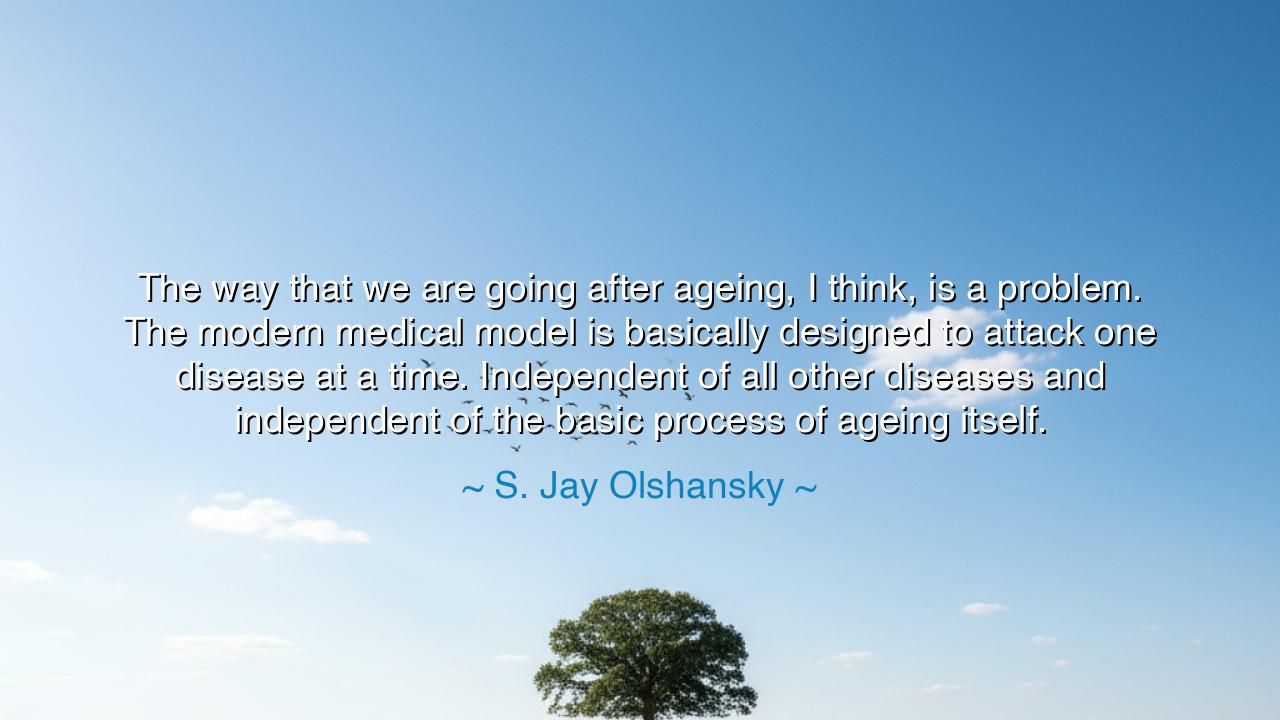
The way that we are going after ageing, I think, is a problem.
The way that we are going after ageing, I think, is a problem. The modern medical model is basically designed to attack one disease at a time. Independent of all other diseases and independent of the basic process of ageing itself.






“The way that we are going after ageing, I think, is a problem. The modern medical model is basically designed to attack one disease at a time. Independent of all other diseases and independent of the basic process of ageing itself.” Thus spoke S. Jay Olshansky, a scholar and philosopher of longevity, whose words pierce through the surface of medicine and strike the very heart of human misunderstanding. His message is not a rejection of science, but a call to wisdom — to see life not as a series of battles against separate foes, but as a single journey guided by harmony and understanding. In this reflection, he challenges the pride of modern medicine, urging us to look beyond the fragments of disease toward the whole fabric of existence itself.
Olshansky’s insight is born from the modern struggle against time — the great and ancient enemy. For centuries, humanity has waged war against illness, crafting cures for every affliction it could name. Yet in doing so, we have mistaken the battlefield for the war. We conquer one disease, and another rises in its place; we build fortresses of medicine, but the march of ageing continues, slow and relentless. In his words, Olshansky reveals the flaw of this endless fight: that medicine, as it is practiced, seeks to defeat the symptoms of time without understanding its essence.
In ancient times, the healers of old — from Hippocrates to Avicenna — saw the body not as a collection of parts, but as a living unity. They understood that to heal one element, one must bring the whole into balance. Illness, to them, was not merely the invasion of a pathogen, but a disharmony within the organism. Yet as knowledge grew and science advanced, humanity began to separate what was once united — the mind from the body, the disease from the host, the symptom from the source. We became masters of precision, but at the cost of wholeness. Olshansky’s lament is the echo of those ancient voices, reminding us that the body is not a battlefield of separate wars, but a garden whose tending requires unity, not division.
Consider the story of Methuselah’s Tree, an ancient bristlecone pine that has stood for nearly five thousand years upon a barren mountain. It has endured storms, droughts, and the passing of empires. Why does it live so long? Because it does not fight each season separately; it adapts, transforms, and accepts. Its life is a harmony between endurance and surrender. So too must humanity learn that ageing is not an enemy to be slain, but a process to be understood and guided. To fight ageing one disease at a time is like trimming the leaves of a dying tree while its roots remain neglected.
In the modern world, medicine often prides itself on victory — curing cancer, managing diabetes, extending life by a few years more. Yet Olshansky reminds us that such victories are incomplete if they do not address the root cause of decline: the process of ageing itself. What use is it to defeat heart disease if the body continues to decay through inflammation, oxidation, and cellular exhaustion? What triumph is it to cure one ailment, only for another to rise in its wake? True wisdom demands that we turn our eyes from the leaves of disease to the roots of vitality. We must learn, as the ancients did, to cultivate life as a whole, not to merely stave off death.
His words also serve as a mirror to our culture’s obsession with immortality — the endless chase to deny time’s touch. We create creams, pills, and surgeries to mask the signs of age, yet ignore the deeper truth that longevity without vitality is not a blessing, but a burden. The wise do not seek to live forever, but to live fully — to make each day burn with health, purpose, and joy. Thus, Olshansky calls upon us not to conquer ageing as an enemy, but to ally with it, to study its rhythms, to slow its pace by understanding its design. For when we learn to walk beside time rather than against it, we may discover that the true secret of longevity lies not in denial, but in balance.
So, my children, let this teaching be a lantern for your path: Do not seek health as the absence of disease, but as the harmony of the whole. Look not only to the cures of today, but to the wisdom of life itself. Eat with awareness, move with purpose, rest with reverence, and think with peace — for in these simple acts, the process of ageing softens its hold. Support the science that seeks not only to lengthen life, but to enrich it.
And remember this above all: as S. Jay Olshansky reminds us, medicine without philosophy is like a ship without a compass. To heal humanity, we must first understand what it means to live — not merely to breathe longer, but to burn brighter. Respect the body as one, honor the flow of time, and seek balance instead of conquest. In doing so, you will not only lengthen your years, but deepen their worth, turning the march of time from an enemy into a companion on the long and noble journey of life.






AAdministratorAdministrator
Welcome, honored guests. Please leave a comment, we will respond soon